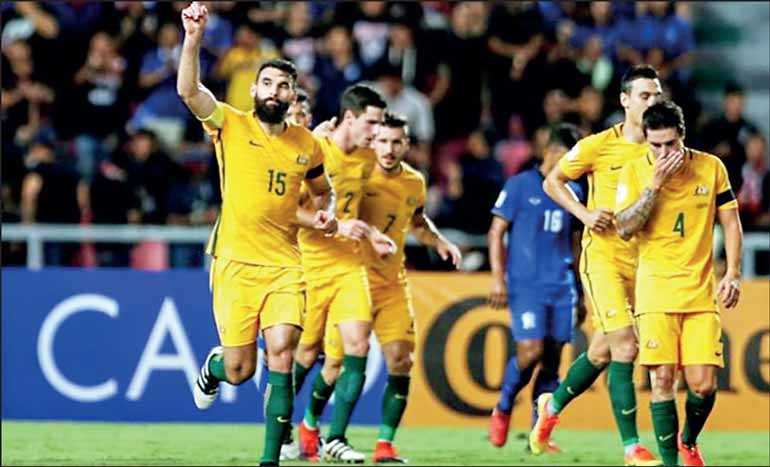Monday Feb 16, 2026
Monday Feb 16, 2026
Wednesday, 2 January 2019 00:00 - - {{hitsCtrl.values.hits}}

SYDNEY (Reuters): The 17th Asian Cup finals will be the biggest in the 62-year history of the tournament but even with 24 teams battling it out, it is hard to look much beyond regional powers Iran, Japan and South Korea as potential champions.
Australia will be hoping to join that trio and Saudi Arabia as multiple winners of the continental crown as they defend the title they won on home soil four years ago.
The Socceroos triumph came at the end of a highly successful staging of a tournament played out in front of bumper crowds that has left the United Arab Emirates much to live up to.
The Emiratis, playing hosts for a second time after 1996 when they reached the final, showed with their recent staging of FIFA’s Club World Cup, though, that there is a passion for the game that can be awoken by local success.
Al Ain’s run to the final against Real Madrid brought passionate crowds to the stadiums of Abu Dhabi and provided a welcome pre-tournament boost to a national team that has hardly set the world alight under Italian Alberto Zaccheroni.
It is fair to say, though, that Real also brought more world class footballers to the Emirates than the Asian Cup will with only South Korea skipper Son Heung-min likely to register with many casual football fans outside the Asia-Pacific.
That does not mean there will not be plenty of skilful football on display as the cream of the world’s most populous continent contest the equivalent of the European Championship and Copa America.
The world’s most populous countries will both be represented but neither China nor India are expected to be around at the business end of the tournament.
The Indians would probably not have qualified without the expansion from 16 teams, while China appear to have stagnated under the guidance of Italian World Cup winner Marcello Lippi.
Under an agreement with his club Tottenham Hotspur, Son will only join the fray for the third and last Group C match against Lippi’s side as well as the knockout stage.
The Taeguk Warriors should have more than enough quality to seal one of the top two spots in the group without him, though, given the other two teams in it are debutants in the shape of Kyrgyzstan and Sven Goran Eriksson’s Philippines.
South Korea, who won the first two Asian Cups and finished runners-up to Australia in 2015, look like the form team in Asia going into the tournament, having gone unbeaten in six matches under Portuguese coach Paulo Bento since their World Cup exit.
Japan, who made the last 16 in Russia before going out to a thrilling Portugal comeback, also look to have a reasonably straightforward passage having been drawn with Uzbekistan, Oman and Turkmenistan in Group F. Hajime Moriyasu has had the Samurai Blue playing an attractive attacking style since he took over after the World Cup and even without Shinji Kagawa and Shinji Okazaki they have enough quality to challenge for a fifth title.
The importance of midfielder Aaron Mooy to Australia’s challenge was illustrated when coach Graham Arnold included him in the squad even though Huddersfield Town had ruled him out of tournament because of a serious knee injury.
For all the class on the ball that Mooy can provide when fit, though, Australia’s title defence is most likely to rest on their ability to find the net now that the totemic Tim Cahill has finally hung up his personalised boots. A continent as vast as Asia can rarely have put on any sporting event without the backdrop of some political turmoil — astonishing as it may now seem, Israel won the title in 1964 — and the 2019 Asian Cup will be no exception.
Saudi Arabia, who won the last of their three titles the last time the UAE hosted, severed diplomatic ties with Group E rivals Qatar in June, 2017 over Doha’s alleged support of terrorism. Qatar denies the accusations. The UAE also joined the diplomatic and economic boycott of Qatar last year but the 2022 World Cup hosts will be looking to ignore the distractions and hoping their side can offer some hope of success, or at least no disgrace, in four years’ time.
There are also representatives of the more troubled countries and territories of the west of the continent with Syria, Palestine, Iraq and Yemen all looking to bring cheer to people who have endured much hardship in recent years.
Iraq did just that with their fairytale run to the title in 2007 and the Lions of Mesopotamia have been drawn to play neighbours Iran in Group D.
Iran have had their traditional uncertain run-up to the tournament but are always a force to be reckoned with in Asia and an end to their 43-year wait for a fourth title cannot be discounted.
Carlos Queiroz’s side went out of the last Asian Cup on penalties to Iraq in a thrilling quarter-final played out in a magnificent atmosphere in Canberra.
If their 16 January group match in Dubai comes anywhere close to matching that, and the tournament can produce a few more clashes with similar drama and passion, the fans that do turn up in the Emirates will be in for a rare treat.